Daily Vocabulary Words: List of Daily Used Words in Leading International Newspapers
Hi there. Welcome to this special section @ Wordpandit.
Our endeavour here is very simple: to highlight important daily vocabulary words, which you would come across in leading newspapers in the country. We have included the following newspapers in our selection:
• The New York Times
• The Washington Post
• Scientific American
• BBC
• The Guardian
• Psychology Today
• Wall Street Journal
• The Economist
We are putting in extensive work for developing your vocabulary. All you have got to do is be regular with this section and check out this post on a daily basis. This is your repository of words that are commonly used and essentially, we are posting a list of daily used words. Hence, this has significant practical application as it teaches you words that are used commonly in leading publications mentioned above.
Visit the website daily to learn words from leading international newspapers.
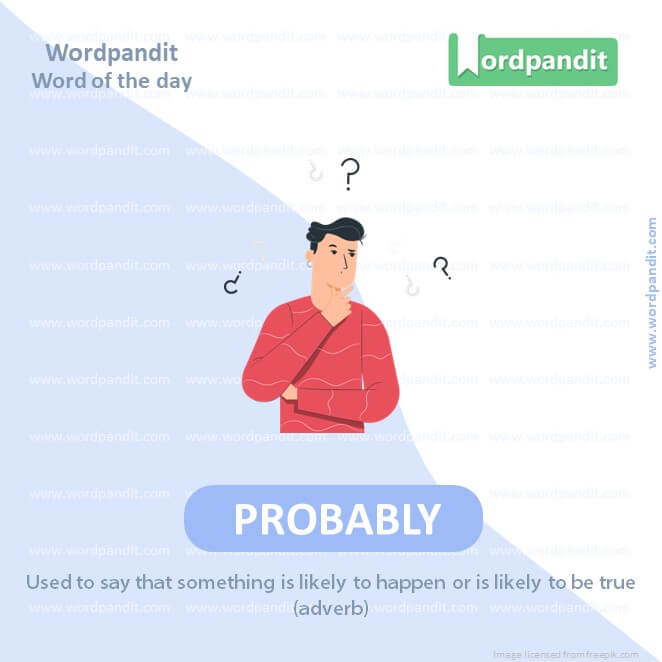
WORD-1: PROBABLY
CONTEXT: It begins with the recognition that there is probably zero hope for any resolution of the Israeli-Palestinian conflict or the Israel-Iran conflict without leadership change in Tehran, Jerusalem and Ramallah.
SOURCE: New York times
EXPLANATORY PARAGRAPH: “Probably” is a word we use when we think something might happen, but we’re not completely sure. It’s like when you guess that it might rain because you see dark clouds in the sky.
MEANING: Used to say that something is likely to happen or is likely to be true (adverb).
PRONUNCIATION: PRAH-buh-blee
SYNONYMS: Likely, possibly, perhaps, maybe, presumably
USAGE EXAMPLES:
1. It will probably snow tomorrow, so we should wear warm clothes.
2. She will probably arrive late, as she’s always running behind schedule.
3. He probably forgot about the meeting since he didn’t reply to the email.
4. There will probably be a lot of traffic during rush hour.
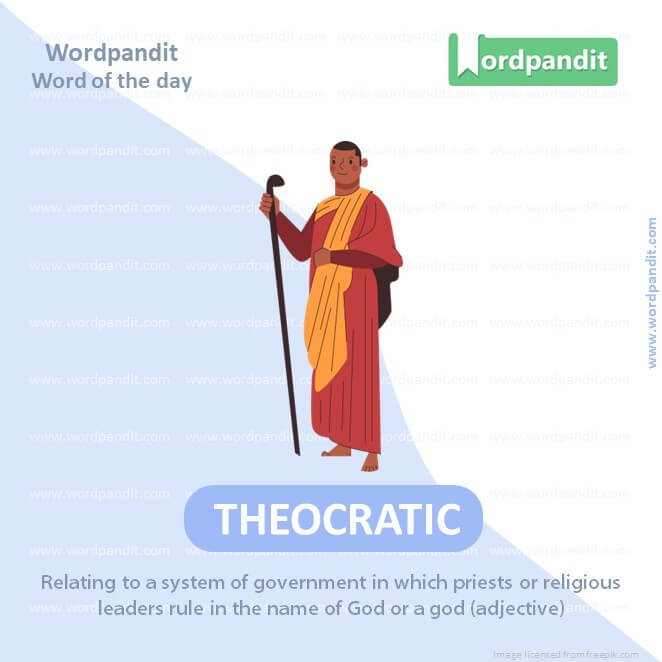
WORD-2: THEOCRATIC
CONTEXT: Given how many times Iranians have challenged their theocratic regime only to be crushed by its iron fist, it’s clear that there is a will. We just have to hope they find a way one day soon.
SOURCE: New York times
EXPLANATORY PARAGRAPH: “Theocratic” is a big word that means a country or a place where the leaders are also religious leaders. It’s like if your teacher at school was also the head of your church or mosque.
MEANING: Relating to a system of government in which priests or religious leaders rule in the name of God or a god (adjective).
PRONUNCIATION: thee-uh-KRAT-ik
SYNONYMS: Ecclesiastical, clerical, religious, priestly
USAGE EXAMPLES:
1. The country’s government was theocratic, with religious leaders making all the decisions.
2. The ancient civilization was ruled by a theocratic council of priests.
3. The theocratic regime imposed strict religious laws on its citizens.
4. The city-state operated under a theocratic monarchy.
WORD-3: RIDICULING
CONTEXT: In fact, social media accounts in the Arab world have been rife with jokes ridiculing the Iranian regime for basically being 0-for-300, and suggesting that the only people who died did so from laughter.
SOURCE: New York times
EXPLANATORY PARAGRAPH: “Ridiculing” is when someone makes fun of another person, like if they laugh at their clothes or the way they talk. It’s not nice to do because it can hurt the other person’s feelings.
MEANING: Making fun of someone in a cruel or mocking way (verb).
PRONUNCIATION: RID-i-kyool-ing
SYNONYMS: Mocking, taunting, teasing, deriding, jeering
USAGE EXAMPLES:
1. The bully was ridiculing the new student for wearing glasses.
2. She felt hurt when her classmates started ridiculing her accent.
3. He was ridiculing the politician’s speech during the debate.
4. Stop ridiculing your sister and be nice to her.
WORD-4: EMBRACES
CONTEXT: Why is the Palestinian Authority so important? Because it still embraces living in peace with Israel and the Oslo framework meant to lead to two states for two indigenous peoples.
SOURCE: New York times
EXPLANATORY PARAGRAPH: “Embraces” means giving someone a big, warm hug to show them you love them or that you’re happy to see them. It’s like wrapping your arms around someone tightly to let them know you care.
MEANING: Hugs or holds someone closely in one’s arms, usually to show affection or acceptance (verb).
PRONUNCIATION: em-BREY-siz
SYNONYMS: Hugs, cuddles, holds, clutches, squeezes
USAGE EXAMPLES:
1. The family embraces each other tightly when they reunite after a long time apart.
2. She embraces her friend to comfort her when she’s sad.
3. He embraces his children before they go to bed every night.
4. The couple embraces lovingly under the starry sky.
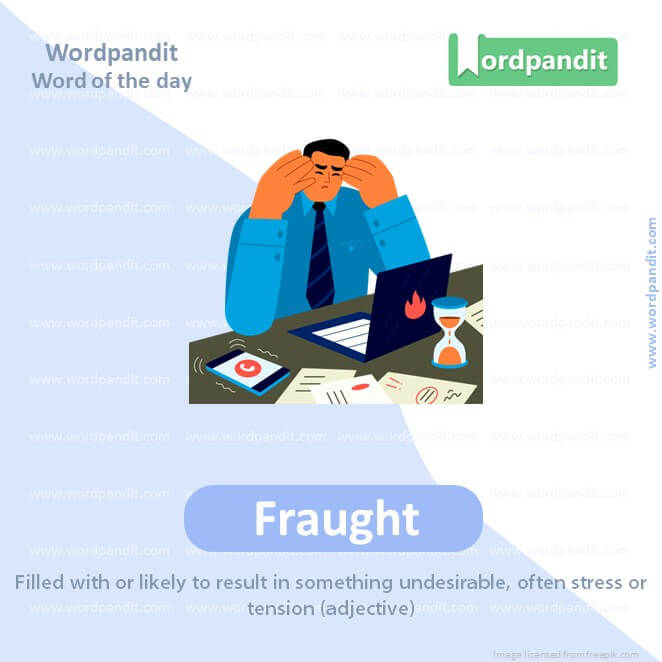
WORD-5: FRAUGHT
CONTEXT: I give the Biden team generally high marks for the job that it has done responding to the hugely fraught and complex Gaza war — and, over the weekend, helping Israel deal with the Iranian missile attack.
SOURCE: New York times
EXPLANATORY PARAGRAPH: “Fraught” means something is filled with a lot of worries or problems. It’s like when you have so much homework to do that you feel stressed and worried about finishing it all.
MEANING: Filled with or likely to result in something undesirable, often stress or tension (adjective).
PRONUNCIATION: frawt
SYNONYMS: Filled, loaded, packed, laden, charged
USAGE EXAMPLES:
1. The journey through the forest was fraught with dangers.
2. Their relationship became fraught with tension after the argument.
3. The negotiations were fraught with difficulties from the beginning.
4. Her mind was fraught with worries about the upcoming exams.
WORD-6: Denigrating
CONTEXT: who spent years making sure that Hamas had enough resources from Qatar to stay in power in Gaza, and prevent any unified Palestinian decision-making body — while, at the same time, denigrating the Palestinian Authority for every fault it had
SOURCE: New York Times
EXPLANATORY PARAGRAPH: “Denigrating” is when someone says mean things about another person to make them feel bad about themselves. It’s like if someone calls you names or tells lies about you to hurt your feelings.
MEANING: Criticizing or belittling someone or something unfairly (verb).
PRONUNCIATION: dih-NIG-ruh-ting
SYNONYMS: disparaging, demeaning, derogatory, insulting, degrading
USAGE EXAMPLE:
1. She felt hurt by the denigrating comments made by her classmates.
2. He was denigrating the efforts of the volunteers who worked hard to clean up the park.
3. The article was criticized for denigrating the reputation of the scientist.
4. Stop denigrating your brother and learn to appreciate his strengths.
WORD-7: Sticking
CONTEXT: Netanyahu never praised the authority for sticking to nonviolence (unlike Hamas) and for the way its security services helped Israel keep the West Bank from exploding despite the huge expansion of Israeli settlements.
SOURCE: New York Times
EXPLANATORY PARAGRAPH: “Sticking” means staying in one place without moving. It’s like if you put a sticker on your notebook, and it stays there until you decide to take it off.
MEANING: Adhering or clinging to something firmly and remaining in place (verb).
PRONUNCIATION: STIK-ing
SYNONYMS: adhering, clinging, attaching, holding, affixing
USAGE EXAMPLE:
1. The mud was sticking to her shoes after walking through the wet grass.
2. The tape wasn’t sticking to the wall properly.
3. The paintbrush was sticking to the canvas, making it hard to move smoothly.
4. The label was sticking to the jar so tightly that it tore when she tried to remove it.
WORD-8: Invaded
CONTEXT: Moreover, last October, Israel invaded Gaza under Netanyahu’s leadership with no exit strategy, no plan for the morning after and no Palestinian partner that can govern Gaza, along with friendly Arab armies, if Israel can bring down the Hamas government.
SOURCE: New York Times
EXPLANATORY PARAGRAPH: “Invaded” means when someone or something forcefully enters a place where they’re not supposed to be, like if a group of ants comes into your kitchen looking for food.
MEANING: Entered a place or territory aggressively and with hostile intent (verb).
PRONUNCIATION: in-VEY-did
SYNONYMS: infiltrated, encroached, trespassed, overrun, penetrated
USAGE EXAMPLE:
1. The army invaded the enemy’s territory under cover of darkness.
2. The garden was invaded by weeds after weeks of neglect.
3. She felt like her privacy was invaded when her personal diary was read without permission.
4. The ants invaded the picnic area in search of crumbs.
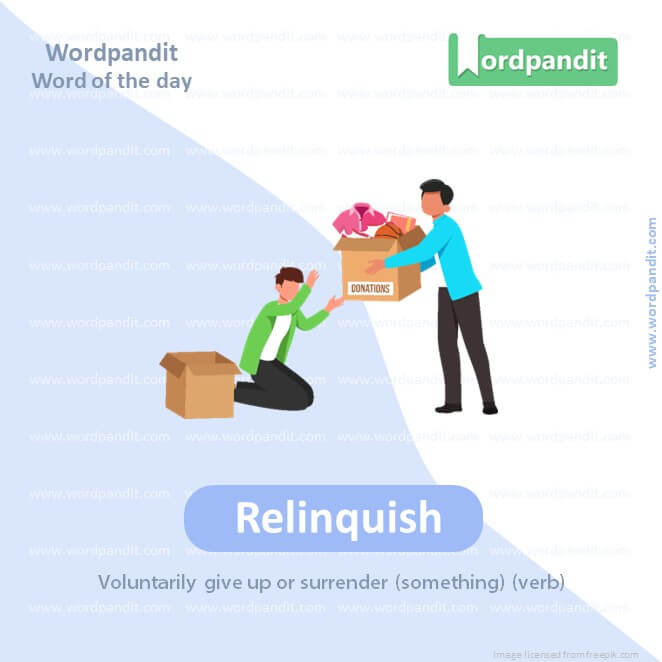
WORD-9: Relinquish
CONTEXT: it is a legitimate partner for a two-state solution that would force Israel to relinquish all or part of the West Bank.
SOURCE: New York Times
EXPLANATORY PARAGRAPH: “Relinquish” means to let go of something or give it up willingly. It’s like if you have a toy that you love but decide to give it to your friend because you want them to be happy.
MEANING: Voluntarily give up or surrender (something) (verb)
PRONUNCIATION: ri-LING-kwish
SYNONYMS: surrender, give up, abandon, yield, cede
USAGE EXAMPLE:
1. He was forced to relinquish control of the company after the scandal.
2. She reluctantly relinquished her hold on the family heirloom.
3. The defendant agreed to relinquish his rights to the property in exchange for a reduced sentence.
4. The king refused to relinquish his throne despite pressure from his advisors.
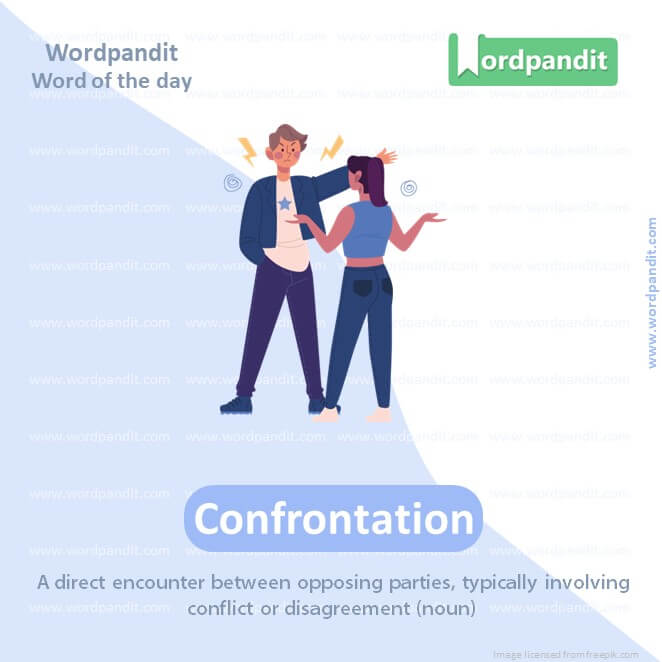
WORD-10: Confrontation
CONTEXT: This is not only incredibly dangerous for Israel in terms of the future of Gaza, but also — one can now clearly see — for the confrontation with Iran, which is going to a whole new level.
SOURCE: New York Times
EXPLANATORY PARAGRAPH: “Confrontation” is when two or more people have a big argument or fight about something. It’s like if you and your friend disagree about which game to play and end up shouting at each other.
MEANING: A direct encounter between opposing parties, typically involving
conflict or disagreement (noun).
PRONUNCIATION: kon-fruh n-TEY-shuhn
SYNONYMS: conflict, clash, altercation, dispute, showdown
USAGE EXAMPLE:
1. The confrontation between the two rival gangs ended in violence.
2. She avoided confrontation with her neighbor over the loud music.
3. The heated confrontation between the union and management led to a strike.
4. He tried to defuse the confrontation before it escalated further.
Vocabulary Hard Words
The experience of unraveling the depths of language learning often leads us to ‘vocabulary hard words’. These challenging jargons might seem daunting initially, but with the right learning strategies, the enigma of ‘vocabulary hard words’ can turn into an enticing quest. But how can these ‘vocabulary hard words’ be learned effectively?
Firstly, to master ‘vocabulary hard words’, it’s vital to break down the process into manageable steps. Instead of tackling several words at once, focus on understanding a few each day. This gradual approach ensures effective retention and understanding.
Multimedia resources tremendously aid in comprehending ‘vocabulary hard words’. Movies, podcasts, or even music in the target language contribute a comprehensive perspective. They provide real-life contexts and usages of ‘vocabulary hard words’, making them more understandable and less intimidating.
The incorporation of memory-enhancing techniques, such as flashcards or digital apps, can significantly bolster the retention of ‘vocabulary hard words’. Such tools encourage active recall, helping to cement these words into your long-term memory. Mnemonic devices can also aid in making these words more approachable by associating the hard words with relatable images or stories.
Practice is decisive when learning ‘vocabulary hard words’. Using these words in your conversations, written communications, or even social media posts will facilitate a robust understanding and recall.
Finally, do not worry about making mistakes while using ‘vocabulary hard words’. Mistakes are essential stepping stones in the learning process. They provide insights into areas that need more focus and help refine your grasp over these words.
In conclusion, grasping ‘vocabulary hard words’ is undoubtedly a challenging task but not an insurmountable one. With the aid of effective strategies including graded learning, multimedia resources, memory-enhancing tools, and regular practice, the process of mastering ‘vocabulary hard words’ can become an engaging and rewarding journey.











